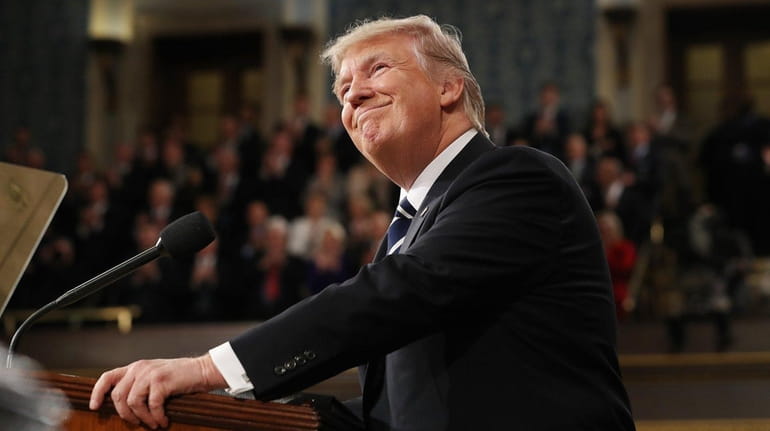Yes, we want to put America first. But just how much winning are we comfortable with?

President Donald Trump arrives to deliver his first address to a joint session of Congress from the floor of the House of Representatives in Washington on Tuesday night. Credit: EPA / Jim Lo Scalzo / Pool
In his speech to Congress Tuesday, Donald Trump said, “My job is not to represent the world. My job is to represent the United States.”
It’s true. As much as we may think of the United States as a global parent to all the less powerful nations that we think need to be lectured, disciplined, protected and given a regular allowance, that’s not the job of our politicians. They draw a salary largely to put America first and to make sure America remains first in the global competition.
But how big a margin of victory should we look for, morally speaking?
One idea Trump hit was trade, pointing to a deficit of $800 billion in goods traded in and out of the United States to show the rest of the world is selling us far more than it’s buying. It’s a misleading number, because when you add services bought and sold, the trade deficit for 2016 drops to $500 billion. But getting caught up in his factual errors isn’t the point here.
Trump sells the idea that we have a big trade deficit because we’re soft, dumb negotiators and other nations con us with unfair practices. There are certainly cases in which that’s true. But the biggest reason we spend more money with other nations than they spend with us is that we have so much more to spend than they do. That’s a good thing.
Think about it this way: When we buy goods and services from Chinese and Mexican people, that means they are working for us. When we sell goods and services to Chinese and Mexican people, that means we are working for them. Do you think the way to make your life better is by creating goods and services to sell to poor foreigners?
The best way to look at income by nations is by analyzing gross domestic product per person. According to the Central Intelligence Agency, in the United States, it was $57,300 in 2016. In Mexico, it was about one-third of that, at $18,500. And in China, the number was $14,300. Again, do you want to work for people who have $14,300 a year of economic activity at their disposal?
Our trade deficit with China is huge, at $347 billion on just $579 billion in total trade between the nations. In truth, a lot of this is because of currency manipulation and unfair trade practices. Trump is right to want to address this, and he should also address all the other societal ills, human rights violations, militaristic posturing and lack of freedoms that make China such a scary foe.
With Mexico, the deficit is a much more reasonable $63 billion on $525 billion in total trade, and that, in view of the difference in income levels in the nations, is a good tally, and one we can live with.
So if those are two countries where we have big deficits, what are the countries that have big deficits with us like? Who is buying more from us than we buy from them? The top five are the Netherlands, Hong Kong, the United Arab Emirates, Belgium and Australia. Would you rather live like people in those nations, or people in China and Mexico?
And then there is the moral question of how we value success in other countries against our own. We want the United States to win. But how much do we want to win by, and how should our policies reflect that?
Do we want to earn 30 percent more than people in other nations? How about 300 percent more? Do we want to be 30 times richer than the people of Taiwan, or 300 times richer than those in Bangladesh?
We shouldn’t.
They are not Americans, those in other lands, and our government does not represent them. But they are parents and children, our brothers and sisters in this human experiment.
We should want them to prosper, too.
Lane Filler is a member of Newsday’s editorial board.
